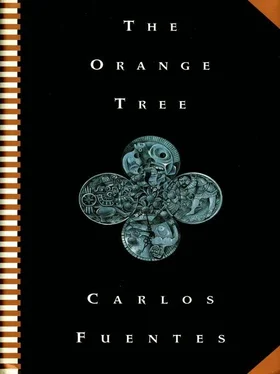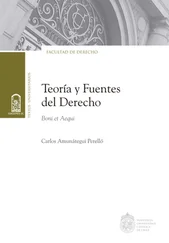The crier will shout out: “This is the justice His Majesty and the Royal Council, acting in his name, order meted out to these men as traitors to the royal Crown.” Etcetera. That’s what I say to the judge: “Etcetera.” It’s one of those Latin expressions my mother taught me. Newly converted to Christianity, she was excited by the idea that the language of religion should be different from the language spoken by the people. Since she would have liked to be, or go on being, a translator, that seduced her and she began to dot her everyday speech with the occasional hallelujah, oremus, dominoes woesbiscuits, requestete in patchy, paternostro, and especially etcetera, which, according to what she told me, means “everything else, the lot, the whole boring thing. In a word: the law.” But on hearing me, the judge took it the wrong way and gave me a huge slap in the face. Then my brother Martín did something unexpected: he punched the insolent Council officer back. He defended me. My brother stuck his neck out for me. I looked at him with a love that saved me, if not him, from all the differences that separated us, some serious and some silly. At that moment, I would have died with him. Begging your pardon now, and if it’s not too much of a bother, I’ll repeat myself to make things clear. I wouldn’t die for him. But I would have died with him.
MARTÍN 1
I can’t explain why they neither sentenced nor executed us. The entire city is a jail and a torture chamber. It’s easy to see, to know, to smell, and, besides, we’re told. Opposite us, the platform where we, like the Ávila brothers, would have our heads cut off was already finished. Why don’t they get it over with? Is this the judge’s torture for my having slapped him? Well, the Quesada brothers paraded past us, crucifixes in hand, still stunned by the rapidity of their sentence, convinced right down to the last minute they weren’t to die; Cristóbal de Oñate was drawn and quartered; Baltasar de Sotelo was found innocent of any wrongdoing in the Mexico conspiracy, but he was executed in any case for having served in Peru during Gonzalo Pizarro’s uprising against the King — a victim of guilt by suspected association; right before our eyes passed Bernardino de Bocanegra mounted on a mule, preceded by the crucifix and the crier, followed by his mother, his wife and family, the women all barefoot and hatless, their hair as tangled as Mary Magdalene’s, dragging their mantles in the dust, weeping, begging that the gentleman be granted a pardon. That was the only time the dreaded Muñoz Carrillo showed compassion: he commuted Bernardino de Bocanegra’s sentence to destitution of all worldly possessions, twenty years in the King’s galleys, and, after that, perpetual exile from the kingdoms and territories of His Majesty Don Felipe II.
Thus my brother and I had no idea what to expect. Would we lose our heads, be exiled, or row for the rest of our lives? The wily Muñoz Carrillo dropped no hints, but had bells rung at our door as if it were already dawn and our turn to go to our final rendezvous. He had crucifixes paraded under our noses and tied burros under our windows. Why didn’t anything happen? We saw the heads of those already executed displayed on pikes and then disappear from the plaza and the government buildings. The town councillors protested. The heads on display were a sign of treason. But the city had not been disloyal. The orgy of executions, however, went on.
Each time a head fell, that hypocrite judge Muñoz would intone these words: “He was merciful to himself, he went to enjoy the presence of God because he died a good Christian and was rewarded with many Masses and prayers.” I told my brother Martín, the son of Malinche: “The judge is doing all this to show that His Majesty is being well served and will, in his turn, grant the judge many favors.” More astute than I, my brother saw a sign of Muñoz Carrillo’s waning power in all this. Then he added, “But you’re right. He’s trying to get on the good side of the King. He’s a miserable lackey. The motherfucker.” I’d never heard that word and supposed it was one of the many La Malinche had taught my half brother. Even so, I liked the expression: Hijo de la chingada.
It gave me great pleasure to apply it to the man who’d informed on us, Baltasar de Aguilar, when the new viceroy finally reached Mexico. Don Gastón de Peralta, Marquis of Falces, found himself in a city silently rebelling against Judge Muñoz Carrillo. The first thing he did was to decide that my brother and I should be immediately sent to Spain because the Council of Mexico was not impartial and could not try our case properly. And that was the intent of the King himself, Don Felipe II, with regard to the sons of a man who had given such glory to Spain.
The moment that pimp Baltasar de Aguilar, the informer, learned the viceroy was proceeding benevolently with us, he withdrew his accusations in order to appease all sides. I think it was then, only then, that the divine flame of justice began to blaze within me. I requested the opportunity to meet the motherfucker (I’m talking like my brother now) face-to-face, and Muñoz Carrillo decided to be present. Contrite, Baltasar de Aguilar knelt before me and begged forgiveness. I told him there was no way to forgive the death of Alonso de Ávila, my most beloved brother, which was his fault. Aguilar was beside himself, but not the judge, who had only a few days left of power. “Why didn’t Alonso de Ávila defend himself?” the judge asked me. I didn’t know what to say. The boorish Muñoz Carrillo dragged his callused hands across his face and in a cavernous voice, in whose depths neither laughter nor resentment could be detected, told us: “Among his possessions were found a multitude of love letters from the most highly placed women in this city.” “Then he died in order not to compromise them,” I said, full of admiration. “No. He died because in his little notes Don Alonso bragged about his conspiracy, described it in detail, and promised the ladies infinite riches and privileges when he and you, Don Martín, would share the governing of Mexico,”
The sentence was just. I was a perfect fool.
MARTÍN 2
I think that out of all these errors we were saved only by the innate sense of justice of the viceroy, Don Gastón de Peralta, who determined that in the case of this conspiracy to seize the land and tear possession of Mexico away from the King of Spain he would proceed according to the following criteria. The first to denounce the conspiracy would receive benefits. When he heard that, Aguilar shouted for joy. But the second to denounce the conspiracy would only be pardoned. Aguilar’s face became serious. And the third to denounce the conspiracy would be executed. The miserable Aguilar went down on his knees, imploring: “And what about those of us who simply repented and backed down?”
I mean that there is some justice in all this after all. That bastard Baltasar de Aguilar was sentenced to ten years in the galleys for perjury, with the loss of all his property and the towns he possessed, as well as perpetual exile from all the Indies of the Ocean Sea and Terra Firma. Returned to Spain in a schooner, Judge Muñoz Carrillo suffered a fit of apoplexy when he read a letter in which King Felipe removed him from office, becoming even squarer than he was already by nature: “I ordered you to New Spain to govern, not to destroy.” He lost the ability to speak, and to cure him the doctors pried open his mouth with sticks so he could swallow their concoctions. He died, this man with the sandpapered face and strands of mandrake hair on his head. Everyone knows that these homunculi are born at the base of the gallows. Our particular homunculus, Judge Muñoz, had to be gutted and salted so he wouldn’t be buried at sea. Just before dying, he managed to say: “I want to be buried at El Ferrol.” But storms broke out, and the sailors mutinied. Carrying a dead body on a ship brings bad luck. They threw him overboard, tightly bound and wrapped in filthy mats covered with pitch.
Читать дальше












